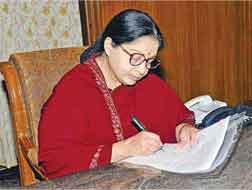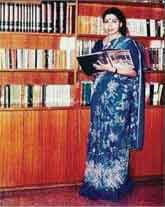Jayalalithaa who served five terms as the Chief Minister of Tamil Nadu for over 14 years between 1991 and 2016, continues to be in news even after her demise last December, for political reasons. Her prowess of the pen, though, is less known

After Jayalalithaa died, those who had worked with her (including Bollywood actor Dharmendra, who acted with her in the 1968 hit, Izzat) never failed to mention that Jayalalithaa was a voracious and intelligent reader. Books were her constant companions on film sets. How many know that Jaya was a writer as well?
In the 80s, K Rajendran, the then editor of the Tamil magazine Kalki, had met Jayalalithaa. By then, Jaya had retired from acting. Her last movie was based on the novel Nadiyai Thedi Vandha Kadal (The sea that came in search of the river), written by Salem-based writer T K Balasubramaniam, whose pen name was Maharishi.
For someone−who began her career with Kalyan Kumar in a Kannada film and bagged her first Tamil film with MGR–acting in her last movie with Sarath Babu, then an upcoming character actor, was clearly a great let down. However, her cinematic decline was more than compensated by her successful foray into Tamil Nadu politics.
Jaya told Rajendran that she had just finished writing a novel for Eve's Weekly, a woman's magazine published from Mumbai. Rajendran made a fervent appeal to her to write the Tamil version of the novel. Jaya agreed. The result was the novel, Uravin Kaidigal (Prisoners of a relationship). The way Jaya had sketched the characters in the novel was a clear reflection of the aversion that she had developed for movies by then.
The novel was about the love that blossoms between an aging superstar, Rajeev, and a young college student, Usha. Inspired by the real life Rajinikanth-Latha love story (Rajini was Jaya's neighbour), Jaya had written about the first meeting between Usha and Rajeev. Usha, along with her college mates, manages to go to Rajeev's bungalow to invite him as the chief guest for a college function. Enamoured by the beautiful and vivacious Usha, Rajeev agrees to be the chief guest for the function and soon they are madly in love. Unable to resist their physical attraction to each other, Rajeev and Usha have pre-marital sex. Usha becomes pregnant with Rajeev's baby. Rajeev, who until then was a playboy, has turned over a new leaf and is serious about settling down with Usha.
Jaya told Rajendran that she had just finished writing a novel for Eve's Weekly, a woman's magazine published from Mumbai. Rajendran made a fervent appeal to her to write the Tamil version of the novel. Jaya agreed. The result was the novel, Uravin Kaidigal (Prisoners of a relationship)
In one of the issues of Kalki, a reader had written a letter stating that the previous part of the serial had mentioned that the college had managed to attract 25,000 people for its annual day function. The letter had sardonically remarked, "Tell me editor, which college can attract an audience of 25,000?". Jaya replied that she had only mentioned 2,500 in her story and it was a printer's devil. She also chided the editor for the error. That was Jayalalithaa’s attention to detail.

Usha is disturbed about her pregnancy, but Rajeev assures her that she need not abort the baby. He also agrees to meet her mother, Kalyani. Until this point, the story seems to be simple. Now comes the twist. Jaya takes us to Kalyani's past. Kalyani, the only daughter of a rich father, is suspicious by nature and suspects her husband of infidelity. Kalyani leaves her husband without mentioning to him that she is pregnant. She does not leave any trace of her whereabouts.
By now, you would have probably guessed that Kalyani was married to Rajeev, who was earlier known by some other name. So now Rajeev has ended up unknowingly impregnating his own daughter. The story, involving incest, ends on a tragic note with both Rajeev and Usha committing suicide and Kalyani ending up in a mental asylum.
The novel was published as a serial in Kalki in 1980 and attracted both strong criticism and praise. The Tamil audience could not accept an incestuous relationship. But Jaya's message about the big bad world of films was loud and clear.
A few years later, Jaya wrote a novel, Nenjile Oru Kanal (A fire in my heart), which she said was partly autobiographical. A poor girl called Devaki is married off to a playboy by the latter's father, a physician. The man happens to be a drunkard and behaves like a beast with Devaki. He dies suddenly, leaving Devaki to fend for herself and her two kids. With no option, Devaki decides to enter the film world. Even as the serial was running, it appears that there was a misunderstanding between the Kumudam team and Jayalalithaa and the second part of the novel got serialised in Valampuri, John's now-defunct magazine Thai. That was the last one heard of Jaya's tryst with writing.
By the mid-80s, Jaya became busy in politics and, after MGR's death in 1987, she had no time to write fiction. But the fact is that she would have made a name as a writer, given her proficiency both in English and Tamil.
Even though she got an honorary doctorate degree, had she pursued a doctoral programme, Jayalalithaa would surely have earned laurels. She was an erudite individual who had a flair for writing and considered books as her companions. I am not sure many can come close to her legendary reading habits. Veda Nilayam, her abode in Poes Garden, boasted of a library housed in a huge room.
It is rather sad that despite being an actress of substance, Jaya never got her due as an actress. She acted in so few films and her peak period with MGR lasted barely four years (1966-1970). By then she had exhausted herself acting in so many movies with her mentor. MGR chose the younger Latha, instead of Jaya, for Ulagam Sutrum Valiban (Globetrotting Youngster)
It would have been great to read one of the books penned by her in English, the language she was most comfortable with. But that was not to be.
by Bhagyalakshmi Seshachalam